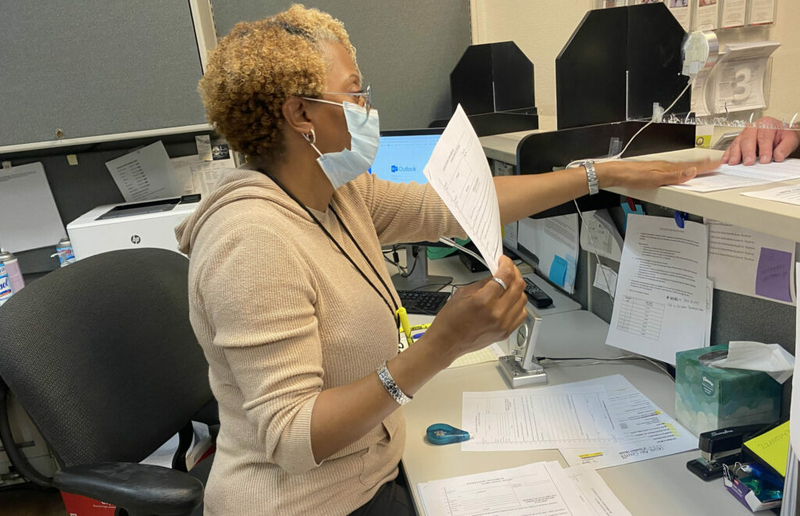Center offering legal information on eviction, civil matters sees high volume of clients

Attorneys with the Legal Aid Center of Southern Nevada liken the Civil Law Self-Help Center to a legal emergency room.
People find themselves at the center when they become overwhelmed by an often confusing, cumbersome legal system and need help finding a resolution.
That’s exactly what Rudy and Liza, who are married, needed when they walked in one morning last week after receiving a seven day pay-or-quit notice on their apartment door.
Walking out of the center with their 2-month-old, they now have the paperwork needed to help them file an answer in hopes of staving off an eviction and remaining in their apartment. Even with some direction on how to fight their eviction, they still find the process confusing.
“I’ve never done this before so I still don’t know what to do,” she said.
Located within the Regional Justice Center, just across the way from where eviction court is held, LACSN’s Civil Law Self-Help Center does not offer legal assistance, said Jonathan Norman, the statewide advocacy, outreach and policy director for Nevada Coalition of Legal Service Providers.
Instead, people can obtain basic legal information, he said, and answer a basic question: “how do I do this?”
“It’s guiding people through the process and making sure they are checking the right boxes to have their case heard,” he said.
While people can come in seeking legal information on a variety of civil matters – there is a separate family law center in the Southern Nevada Family Justice Center — Norman said he “would feel comfortable saying 90% are there for evictions.”
Last year, 62,328 people came through the center to get help with paperwork and be directed to absolving civil matters.
Ahead of Clark County’s large-scale rental assistance CARES Housing Assistance Program (CHAP) expiring earlier this month, legal aid attorneys and social service providers alike warned an eviction crisis could be imminent.
Norman said in previous years, December has normally been a slower month for evictions. But 5,466 people came through the center in December, making it the second busiest month of the year, and heightening concern over what’s to come.
In the first week since the full CHAP program ended – now rental assistance is only available for a very limited group of people who live on fixed incomes like Social Security and already received an eviction notice – the center saw 1,215 people.
The center, which typically averages around 300 visits daily, had several days in January where more than 400 people stopped by:
- 479 people on Jan. 3
- 430 on Jan. 17
- 505 on Jan. 18
“We will know once we have a full month with CHAP being gone,” Norman said. “I think we’re going to look in February and understand where we’re headed.”
’When it rains it pours’
Days ahead of rental assistance ending, Barbara Buckley, the executive director for the Legal Aid Center of Southern Nevada, said if people don’t believe there is an eviction crisis to come to the Civil Law Self-Help Center and see it for themselves.
A total of 5,198 people visited the center in January as of Jan. 26.
On Tuesday morning last week, people arrived at the center in waves frantically trying to navigate the eviction process.
In Nevada, unlike other states, the summary eviction process requires tenants be the first to file with the court after being served with a pay or quit notice.
While equipped with more information than they had before entering the center, most leave still frantic on the next steps of a legal process they most likely have to endure alone.
One man named Tori quickly explained he was $4,000 behind on rent. He and his girlfriend broke up last year and he was left with the rent after she moved out of state.
He quickly fell behind and now is facing eviction.
“I know this is going to be a long process,” he said before heading into a court hearing.
Rudy and Liza said this is the first time either of them had ever received an eviction notice.
In August, Rudy had to take time off from work as a forklift operator to have surgery to remove kidney stones and then have his gallbladder removed.
He told his human resources department he would be out for several weeks. When he returned to work later in the fall, he was told he didn’t give proper notice for how much time he needed off to recover and was fired.
“It made for a tough Christmas for us,” he said.
In addition to his 2-year-old, he also has two other children, 5 and 12.
Even with Liza, who works in retail, picking up hours during the holiday season, things got tight. After Christmas, Liza, who was the only person employed, said her hours were drastically reduced.
“When it rains it pours,” Rudy said.
For the first time, the family fell behind on their $1,200 rent.
Liza said she took out a payday loan in order to attempt to catch up on rent and is only $600 shy of paying the remainder.
While they try to get whole, the family received an eviction notice – the landlord told the family he sent three notices but Rudy only got one – in mid-January.
In addition to assisting with tenants’ rights cases, Legal Aid helps clients dealing with the fallout of payday loans, which remain unregulated in Nevada and can come with interest rates upward of 600%, among the highest in the nation.
Norman called the loans predatory and said they trap people in poverty.
With a social safety net being stretched and large-scale rental assistance ending, those loans are also a last resort for many struggling to keep a roof over their heads.
“We shouldn’t be putting people in our community in the position where they have to choose between a roof over their head and long term financial ruin,” Norman said. “If that person is not able to make their rent because they got a payday loan, what happens next month when they are paying that back and have rent to (pay) again. That family is in a world of hurt. That payday loan does put it off but man what are we doing as a society that we are putting people in that position?”
Note: The individuals seeking legal assistance interviewed for this story requested that their last names not be used out of privacy concerns.








